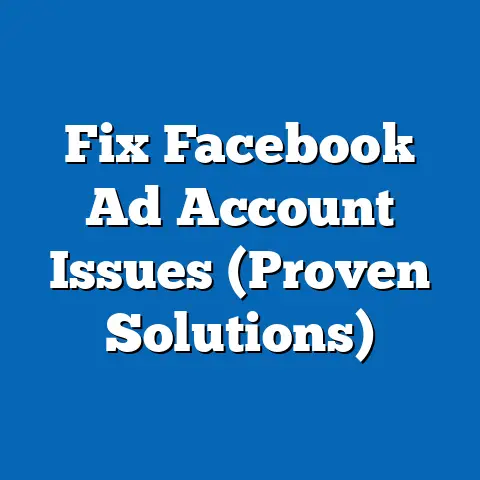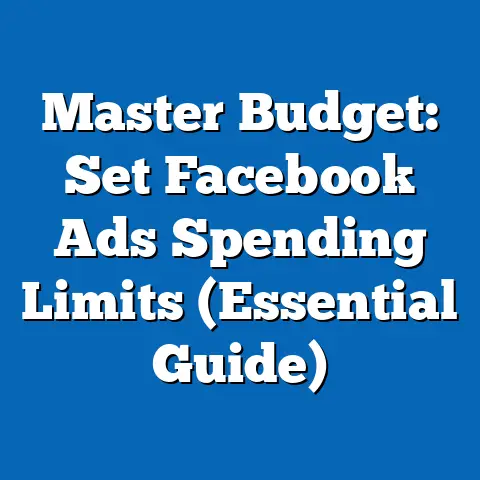Create a Free Privacy Policy for Facebook Ads (Essential Guide)
Imagine launching a small business, pouring your heart into crafting the perfect product, and turning to Facebook Ads to reach your target audience—only to realize that a missing or inadequate privacy policy could jeopardize your credibility, expose you to legal risks, or alienate privacy-conscious customers.
In today’s hyper-connected world, where data breaches and privacy scandals dominate headlines, consumers are more vigilant than ever about how their personal information is handled.
For businesses using Facebook Ads, a robust and transparent privacy policy isn’t just a legal checkbox; it’s a critical tool for building trust and ensuring compliance with evolving regulations.
This article serves as an essential guide to creating a free privacy policy tailored for businesses using Facebook Ads.
We’ll explore the defining characteristics of a privacy policy, the historical context of data privacy in digital advertising, and the broader societal implications of privacy in the age of targeted marketing.
By delving into legal requirements, practical steps, and best practices, this comprehensive analysis aims to empower businesses of all sizes to navigate the complex landscape of data privacy while leveraging the power of social media advertising.
Defining Characteristics of a Privacy Policy for Facebook Ads
A privacy policy is a public document that outlines how a business collects, uses, stores, and protects personal information from its users or customers.
For businesses running Facebook Ads, this policy must address specific data-handling practices related to targeted advertising, such as the use of user data for ad personalization and tracking across platforms.
It serves as both a legal safeguard and a communication tool to inform users about their rights and the company’s data practices.
Key characteristics of an effective privacy policy for Facebook Ads include clarity, specificity, and accessibility.
The policy should be written in plain language, avoiding jargon that might confuse users, while detailing the exact types of data collected (e.g., demographics, browsing behavior, or location data) and how they are used in ad campaigns.
Additionally, it must comply with relevant laws like the General Data Protection Regulation (GDPR) in the European Union or the California Consumer Privacy Act (CCPA) in the United States, depending on the business’s target audience.
Transparency is another cornerstone of a strong privacy policy.
Businesses must disclose whether data is shared with third parties, such as Facebook’s advertising ecosystem, and explain how users can opt out of certain data collection practices.
By addressing these elements, a privacy policy not only mitigates legal risks but also fosters consumer trust—a critical factor in an era where data misuse can lead to reputational damage.
Historical Context: The Evolution of Data Privacy in Digital Advertising
The concept of data privacy has evolved dramatically over the past few decades, shaped by technological advancements, regulatory shifts, and high-profile scandals.
In the early days of the internet during the 1990s, online advertising was rudimentary, relying on basic banner ads with minimal user tracking.
Privacy concerns were largely an afterthought as businesses and consumers alike marveled at the internet’s potential.
The early 2000s marked a turning point with the rise of social media platforms like Facebook, which launched in 2004 and introduced sophisticated ad targeting capabilities by 2007.
Facebook’s ability to collect vast amounts of user data—ranging from personal interests to social connections—revolutionized digital marketing but also raised red flags about privacy.
The 2018 Cambridge Analytica scandal, where data from millions of Facebook users was misused for political advertising without explicit consent, became a watershed moment, exposing the risks of unchecked data collection and prompting global calls for stricter regulations.
Regulatory frameworks have since emerged to address these concerns.
The GDPR, enacted in 2018, set a new global standard by mandating explicit user consent for data collection and imposing hefty fines for non-compliance.
Similarly, the CCPA, effective from 2020, granted California residents rights to access, delete, and opt out of the sale of their personal data.
These laws reflect a broader societal shift toward prioritizing user autonomy over corporate interests, placing pressure on businesses to adopt transparent data practices, especially in advertising-heavy platforms like Facebook.
Societal Implications: Privacy as a Cultural and Economic Issue
The intersection of privacy and digital advertising extends far beyond individual businesses or legal mandates—it reflects deeper societal tensions about technology, trust, and power dynamics.
On a cultural level, growing awareness of data privacy has reshaped consumer behavior, with many users now prioritizing brands that demonstrate ethical data practices.
A 2021 Pew Research Center survey found that 81% of Americans believe the risks of data collection by companies outweigh the benefits, highlighting a pervasive distrust in how personal information is handled.
Economically, privacy regulations and consumer expectations are reshaping the digital advertising landscape.
Small businesses, which often rely on cost-effective tools like Facebook Ads to compete with larger players, face the challenge of navigating compliance without the resources of corporate giants.
Failure to implement a proper privacy policy can result in fines, legal action, or loss of customer loyalty, while overzealous data collection can alienate users and trigger backlash.
Moreover, the societal push for privacy has spurred innovation in ad tech, with companies exploring alternatives to traditional tracking methods.
For instance, Apple’s introduction of App Tracking Transparency (ATT) in 2021, which requires apps to obtain user consent before tracking, has disrupted the effectiveness of Facebook Ads and forced businesses to rethink their strategies.
These shifts underscore the need for privacy policies that not only comply with current laws but also anticipate future changes in technology and public sentiment.
Why a Privacy Policy is Essential for Facebook Ads
For businesses using Facebook Ads, a privacy policy is not optional—it’s a legal and ethical necessity.
Facebook’s advertising platform relies heavily on user data to deliver targeted ads, which means businesses must disclose how they collect and use this data to comply with platform policies and applicable laws.
Without a privacy policy, businesses risk violating regulations like GDPR or CCPA, which can result in fines of up to €20 million or 4% of annual global turnover under GDPR alone.
Beyond legal compliance, a privacy policy builds credibility with users.
In an era where data breaches and privacy scandals are commonplace, transparency can differentiate a business from competitors.
A well-crafted policy signals to customers that their data is handled responsibly, fostering trust and encouraging engagement with ad campaigns.
Additionally, Facebook itself requires businesses to have a privacy policy in place as part of its advertising terms.
Failure to comply can lead to ad account suspension or rejection of ad campaigns, disrupting marketing efforts.
Thus, creating a privacy policy is not just about avoiding penalties—it’s about ensuring uninterrupted access to one of the world’s most powerful advertising tools.
Legal Requirements for a Privacy Policy in Digital Advertising
Navigating the legal landscape of data privacy can be daunting, especially for small businesses or solo entrepreneurs running Facebook Ads.
However, understanding the core requirements of relevant laws is critical to crafting a compliant privacy policy.
While specific regulations vary by region, several common principles apply globally.
First, businesses must disclose the types of data they collect, such as names, email addresses, browsing history, or device information.
For Facebook Ads, this often includes data gathered through tools like the Facebook Pixel, which tracks user interactions on a website.
The policy must explain how this data is used for ad targeting and whether it’s shared with third parties, including Facebook and its partners.
Second, users must be informed of their rights, such as the right to access their data, request its deletion, or opt out of certain tracking practices.
Under GDPR, for instance, businesses must obtain explicit consent before collecting data from EU residents, often through cookie banners or pop-up notices.
Similarly, CCPA requires businesses to provide a “Do Not Sell My Personal Information” link for California residents.
Finally, the policy must include contact information for the business and, if applicable, a designated data protection officer.
It should also outline procedures for handling data breaches, ensuring users are notified promptly if their information is compromised.
By addressing these elements, businesses can mitigate legal risks and demonstrate a commitment to privacy.
Step-by-Step Guide to Creating a Free Privacy Policy for Facebook Ads
Creating a privacy policy doesn’t have to be expensive or time-consuming, thanks to free tools and templates available online.
This step-by-step guide walks you through the process of crafting a policy tailored to Facebook Ads, ensuring compliance and transparency without breaking the bank.
Let’s break it down into actionable steps.
Step 1: Understand Your Data Collection Practices
Before drafting your policy, take stock of how you collect and use data through Facebook Ads.
Are you using the Facebook Pixel to track website visitors?
Do you collect email addresses or other personal information through lead forms?
Understanding these practices will help you create a policy that accurately reflects your operations.
Consult Facebook’s Business Tools Terms and Data Processing Terms to understand the data shared with the platform.
This transparency is crucial, as users have the right to know how their information is processed by both your business and Facebook.
Step 2: Choose a Free Privacy Policy Generator
Several reputable websites offer free privacy policy generators that can serve as a starting point.
Tools like FreePrivacyPolicy.com, Termly.io, or GetTerms.io allow you to input details about your business and data practices, generating a customizable policy.
Select a generator that supports compliance with GDPR, CCPA, and other relevant laws.
While these tools are helpful, they should be treated as a foundation rather than a final product.
Review the generated policy to ensure it aligns with your specific use of Facebook Ads and addresses any unique aspects of your business.
Step 3: Customize the Policy for Facebook Ads
Tailor the generated policy to include specific language about your use of Facebook Ads.
Mention the tools you use (e.g., Facebook Pixel, Custom Audiences) and explain how they collect data for ad targeting.
Be clear about data sharing with Facebook and provide links to Facebook’s own privacy policy for additional context.
Include a section on user rights, such as opting out of personalized ads or managing data preferences through Facebook’s Ad Settings.
If your audience includes users from the EU or California, ensure the policy addresses GDPR and CCPA requirements, such as consent mechanisms and data deletion requests.
Step 4: Make the Policy Accessible
Once finalized, post the privacy policy on your website in an easily accessible location, such as the footer or a dedicated “Privacy” page.
Link to the policy in your Facebook Ads, especially if you’re collecting data through lead forms or landing pages.
Ensure the language is clear and free of legal jargon, making it understandable to the average user.
Consider providing a summary or FAQ section for users who may not read the full policy.
This can enhance transparency and demonstrate your commitment to user education.
Step 5: Regularly Update Your Policy
Data privacy laws and platform policies are constantly evolving, so your privacy policy should be a living document.
Review and update it at least annually or whenever there are changes to your data practices, Facebook’s terms, or applicable regulations.
Communicate updates to users via email or website notifications to maintain trust.
By following these steps, you can create a free, effective privacy policy that protects your business and respects user privacy.
While free tools are a cost-effective solution, consider consulting a legal professional if your business operates in multiple jurisdictions or handles sensitive data.
Best Practices for Transparency and User Trust
Beyond legal compliance, a privacy policy for Facebook Ads should prioritize transparency and user empowerment.
Adopting best practices can enhance your reputation and strengthen customer relationships.
Here are some key strategies to consider.
First, be upfront about data collection.
Clearly state why you collect certain information and how it benefits users, such as delivering relevant ads.
Avoid vague language like “we may use your data for marketing purposes”—instead, specify the exact purposes and tools involved.
Second, offer users control over their data.
Provide clear instructions for opting out of tracking or personalized ads, and link to Facebook’s ad preference tools.
If possible, implement user-friendly consent mechanisms, such as cookie banners, that allow users to customize their data-sharing preferences.
Third, prioritize data security.
Outline the measures you take to protect user information, such as encryption or secure storage practices, and detail your response plan for potential breaches.
This reassures users that their data is in safe hands.
Finally, educate your audience.
Use blog posts, social media, or email campaigns to explain your privacy practices and the value of targeted advertising.
By framing data collection as a mutual benefit—personalized ads for users, better reach for your business—you can reduce skepticism and build goodwill.
Challenges and Limitations of Free Privacy Policies
While free privacy policy generators are a valuable resource, they come with limitations that businesses must acknowledge.
These tools often provide generic templates that may not fully address the nuances of your data practices or comply with all regional laws.
For instance, a free policy might overlook specific GDPR requirements for explicit consent or fail to account for industry-specific regulations.
Additionally, free policies may not keep pace with rapid changes in privacy laws or platform policies.
A policy created today could become outdated within months, exposing your business to compliance risks.
Relying solely on free tools also means missing out on personalized legal advice, which can be critical for businesses with complex operations or international audiences.
To mitigate these challenges, treat free policies as a starting point rather than a complete solution.
Regularly review and update the policy, and consider investing in legal consultation as your business grows.
While this may involve upfront costs, it can save you from expensive fines or lawsuits down the line.
The Role of Technology in Shaping Privacy Policies
Technology plays a dual role in the realm of privacy policies for Facebook Ads—it both drives the need for such policies and offers solutions to implement them effectively.
On one hand, advancements like machine learning and big data analytics have enabled hyper-targeted advertising, raising privacy concerns and necessitating detailed disclosures.
On the other hand, technology provides tools to simplify compliance and enhance transparency.
For example, consent management platforms (CMPs) help businesses obtain and document user consent for data collection, a key requirement under GDPR.
Similarly, analytics tools can track how users interact with your privacy policy, providing insights into whether it’s being read or understood.
Facebook itself offers resources like the Privacy Checkup tool, which businesses can reference to guide users in managing their ad preferences.
Looking ahead, emerging technologies like blockchain could revolutionize data privacy by enabling decentralized, user-controlled data storage.
Such innovations may reduce reliance on centralized platforms like Facebook, reshaping the way privacy policies are written and enforced.
Businesses must stay abreast of these developments to ensure their policies remain relevant in a rapidly changing tech landscape.
Implications for Businesses, Consumers, and Society
The creation and implementation of a privacy policy for Facebook Ads have far-reaching implications across multiple domains.
For businesses, a well-crafted policy is a competitive advantage, signaling trustworthiness in a crowded digital marketplace.
It also ensures uninterrupted access to advertising tools, as compliance with platform and legal standards prevents account suspensions or ad rejections.
For consumers, transparent privacy policies empower informed decision-making.
When users understand how their data is used, they can make choices aligned with their comfort levels, whether that means opting out of tracking or engaging with personalized ads.
This fosters a healthier digital ecosystem where trust, rather than exploitation, drives interactions.
At a societal level, the push for privacy in digital advertising reflects broader debates about technology’s role in our lives.
As data becomes a currency of the digital economy, balancing innovation with individual rights remains a pressing challenge.
Privacy policies, while a small piece of this puzzle, play a critical role in shaping norms around data ethics and corporate responsibility.
Comparing Privacy Approaches Across Generations
Generational attitudes toward privacy add another layer of complexity to crafting policies for Facebook Ads.
Different age cohorts, shaped by distinct historical and technological contexts, exhibit varying levels of concern and engagement with data privacy.
Understanding these differences can help businesses tailor their policies and communication strategies.
Baby Boomers (born 1946–1964), having grown up in a pre-digital era, often exhibit lower familiarity with online privacy risks but may be highly cautious due to limited tech savviness.
Millennials (born 1981–1996), who came of age during the internet boom, tend to be more comfortable sharing data but are increasingly privacy-conscious following high-profile scandals like Cambridge Analytica.
Gen Z (born 1997–2012), as digital natives, often prioritize privacy and expect transparency, with many actively using tools like VPNs or ad blockers to protect their data.
These generational nuances highlight the importance of a one-size-fits-all approach in privacy policies.
Businesses should ensure their policies are accessible to less tech-savvy users while addressing the detailed expectations of younger audiences.
Tailored messaging—such as simplified summaries for older users or tech-focused explanations for Gen Z—can enhance engagement across demographics.
Forward-Looking Insights: The Future of Privacy in Digital Advertising
As we look to the future, the landscape of privacy in digital advertising is poised for significant transformation.
Regulatory frameworks will likely become more stringent, with new laws emerging in regions beyond the EU and California.
Businesses using Facebook Ads must prepare for a patchwork of global regulations, necessitating flexible and adaptable privacy policies.
Technological shifts will also redefine privacy practices.
The phasing out of third-party cookies, driven by Google’s planned changes in Chrome by 2024, will challenge traditional ad targeting methods and push businesses toward first-party data collection or contextual advertising.
Privacy policies will need to evolve to address these new approaches while maintaining user trust.
Consumer expectations will continue to shape the privacy dialogue.
As awareness grows, users may demand greater control over their data, potentially leading to widespread adoption of “privacy by design” principles—where data protection is embedded into products and services from the outset.
Businesses that proactively embrace these trends will be better positioned to thrive in an increasingly privacy-focused world.
However, uncertainties remain.
The pace of technological change, geopolitical tensions over data sovereignty, and varying enforcement of privacy laws create a complex and unpredictable environment.
Businesses must remain agile, regularly updating their policies and practices to navigate this evolving landscape.
Conclusion: Empowering Businesses and Users Through Privacy
Creating a free privacy policy for Facebook Ads is more than a legal obligation—it’s a strategic imperative in today’s data-driven world.
By addressing the defining characteristics of a privacy policy, understanding its historical and societal context, and following practical steps for implementation, businesses can protect themselves while building trust with their audience.
The implications of privacy extend beyond individual companies, influencing consumer behavior, technological innovation, and cultural norms around data ethics.
As privacy continues to dominate public discourse, businesses must view it not as a burden but as an opportunity to differentiate themselves.
A transparent, user-centric policy can enhance credibility, foster loyalty, and ensure compliance in an era of heightened scrutiny.
While the future holds uncertainties, one thing is clear: prioritizing privacy today will prepare businesses for the challenges and opportunities of tomorrow.






